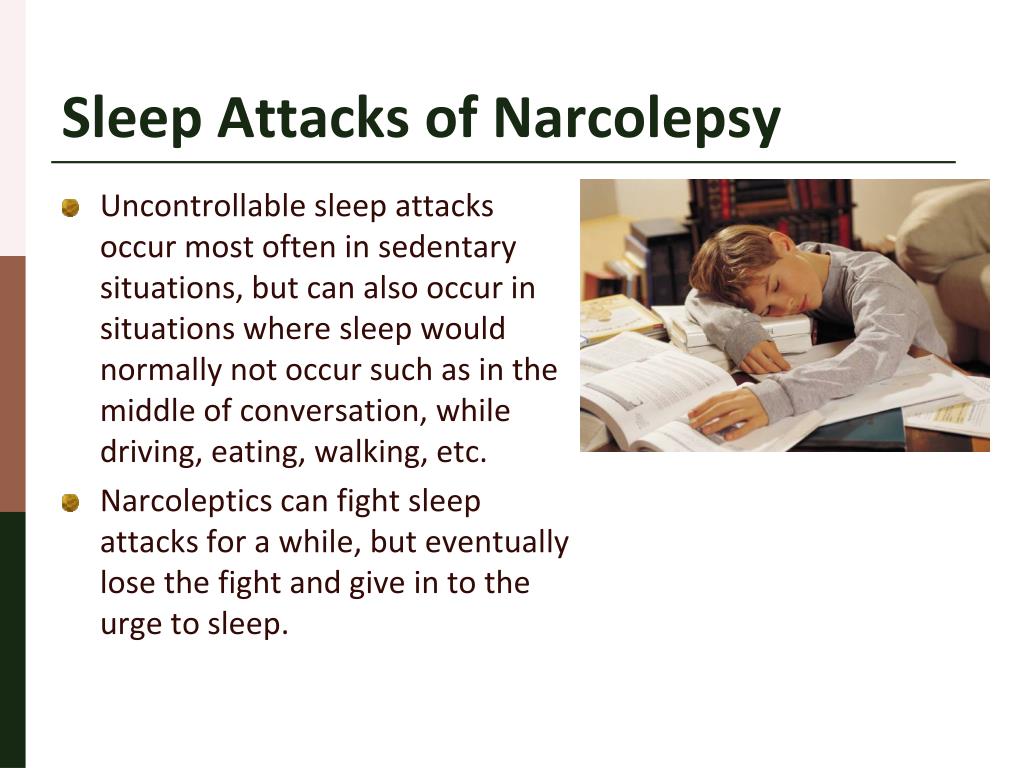

This type of narcolepsy isn’t associated with reduced hypocretin or cataplexy like type 1. Research has not yet identified the exact cause of type 2 narcolepsy. Hypocretin is an essential neurotransmitter in the brain for being alert and wakeful during the day. Without enough hypocretin, the brain can’t properly regulate sleep and wake cycles. Some people with type 1 experience a hypocretin cell reduction as high as 80% to 90%. Type 1 involves a loss of the brain cells that produce hypocretin, aka orexin, which influences how you sleep. Researchers know more about the cause of type 1 narcolepsy than they do about type 2. automatic behaviors: automatically continuing an activity (such as eating, talking, typing, or driving) for a few seconds or minutes after dropping off to sleep without even being aware you’re doing it.fragmented sleep and insomnia: sleep interrupted by vivid dreams, sleep apnea, insomnia, restless leg movements, and acting out while in a dream state.In addition to the primary five symptoms of narcolepsy, you can also experience these other symptoms: This is another common symptom of narcolepsy, with an estimated 30% to 95% of people experiencing it. This is not uncommon.īut when you have narcolepsy, you may find yourself repeatedly waking up throughout the night or even wide awake for most of it. About 25% to 50% of people with narcolepsy report having this symptom. This usually lasts only a few seconds to minutes, and people usually can move and speak once the episode ends. This is characterized by a feeling of being unable to move during the transition between wakefulness and sleep. Many find that short naps during the day can help them feel refreshed, if only for a short period. You can fall asleep for a few seconds or a few minutes, aka microsleeps. Some even report falling asleep mid-conversation. You may find yourself falling asleep easily no matter where you are - at your desk at school or in your office, or even while driving. This constant overwhelming sleepiness comes with “sleep attacks,” which can happen suddenly and often occur no matter how much sleep you’ve gotten.

People who have this symptom have difficulties staying alert or awake during the day. Excessive daytime sleepinessĪll people with narcolepsy have this symptom, which is the most debilitating. About 33% to 80% of people with narcolepsy report having this symptom. Images can be very vivid and sometimes scary. These hallucinations are mainly visual and are frequently described as dream-like experiences during waking (hypnopompic) or falling asleep ( hypnagogic). If you have a severe cataplexy attack, your entire body can collapse, and you may not be able to speak, move, or keep your eyes open. Other mild symptoms include difficulty speaking, jaw tremors, or knee trembles. You may notice that your eyelids start drooping, or you have a slight facial twitch or flicker. While some people only have a few cataplexy attacks in their lives, others may experience several attacks in one day.Ĭataplexy attacks can be mild and involve only minor muscle tone weakness. The number of cataplexy attacks a person has can vary.

This disruption affects hypocretin levels.Ĭataplexy lasts only a few minutes and resolves on its own with no loss of consciousness. Research suggests this is because of a brain circuit disruption between the hypothalamus (sleep) and the amygdala (emotions) brain regions. It’s associated with type 1 narcolepsy only. But narcolepsy rarely goes away completely.This symptom is a short-lived and sudden loss of muscle tone that often happens with strong emotions like anger or laughter. Medicines may help prevent sleep attacks and episodes of muscle weakness.

These periods of muscle weakness are often brought on by strong emotional reactions, such as laughing or crying. The weakness may affect specific muscle groups or may affect the entire body. Sudden, brief periods of muscle weakness while a person is awake (cataplexy).These sleep attacks can occur several times a day and may last from a few minutes to several hours. These may occur at any time during any type of activity, such as eating dinner, driving the car, or carrying on a conversation. Narcolepsy usually starts during the teen years or early adulthood and continues throughout life. Narcolepsy is a disabling sleep disorder that mixes the nervous system's messages about when to sleep and when to be awake.


 0 kommentar(er)
0 kommentar(er)
